人教版八年级英语下册unit9教学设计
- 格式:doc
- 大小:81.00 KB
- 文档页数:3
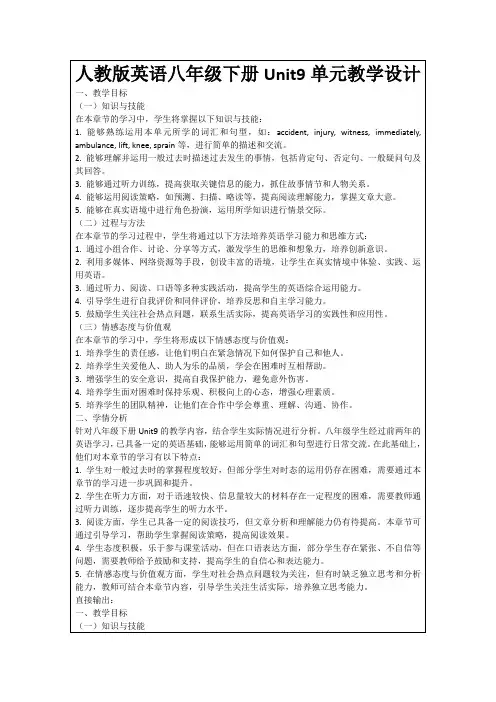
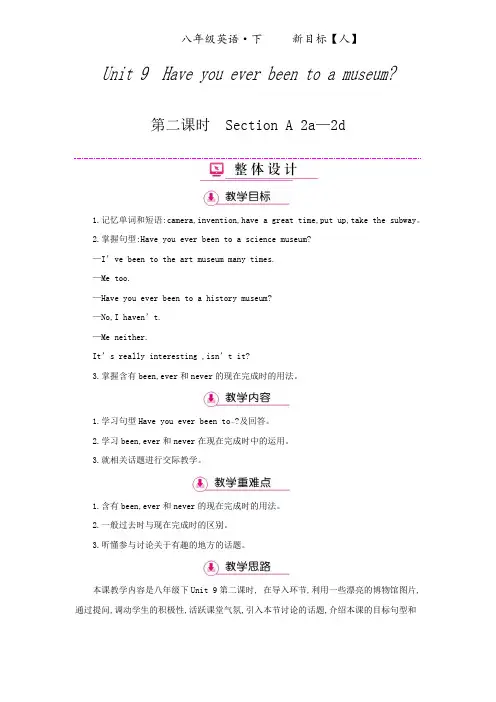
八年级英语·下新目标【人】Unit 9 Have you ever been to a museum?第二课时Section A 2a—2d1.记忆单词和短语:camera,invention,have a great time,put up,take the subway。
2.掌握句型:Have you ever been to a science museum?—I’ve been to the art museum many times.—Me too.—Have you ever been to a history museum?—No,I haven’t.—Me neither.It’s really interesting ,isn’t it?3.掌握含有been,ever和never的现在完成时的用法。
1.学习句型Have you ever been to…?及回答。
2.学习been,ever和never在现在完成时中的运用。
3.就相关话题进行交际教学。
1.含有been,ever和never的现在完成时的用法。
2.一般过去时与现在完成时的区别。
3.听懂参与讨论关于有趣的地方的话题。
本课教学内容是八年级下Unit 9第二课时, 在导入环节,利用一些漂亮的博物馆图片,通过提问,调动学生的积极性,活跃课堂气氛,引入本节讨论的话题,介绍本课的目标句型和单词,在听力环节,注重对学生听力策略的指导,消除学生对听力的“恐惧”心理,让学生能够高效做题。
2d教学是本课综合运用的体现。
通过学习词组、重点句到对话的填空让学生的学习有渐进的过程;抽取学生进行角色扮演,对学生是知识升华的过程。
设计教学PPT,录音机,图片,多媒体。
StepⅠ.Lead in[设计意图]调动学生情感,激活他们头脑中关于过去去过的地方的情感,导入新授。
Leading inT:Boys and girls,do you like traveling?S:Yes.T:Great! Most of you like traveling very much.Me too.Look at the pictures.I went to a lot of places last year.Guess where I went? Use “have/has been to”.S1:You have been to Shanghai.S2:I know you have been to the space museum.S3:You have been to the amusement park.S4:You have been to the zoo.S5:…T:Great! All of you did well.I have been to so many interesting places.Which of these places would you like to visit? Please rank them 1 to 6.space museumhistory museumart museumwater parkzooamusement parkS:…[设计意图]通过情境引入,激发学生情感,便于导入新授内容。
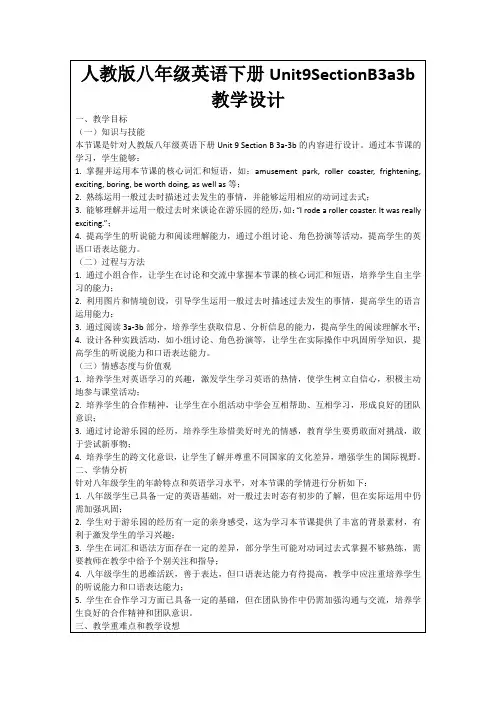
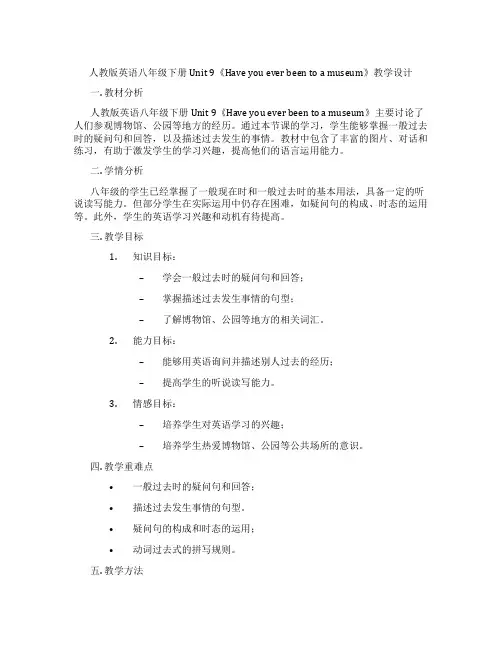
人教版英语八年级下册Unit 9《Have you ever been to a museum》教学设计一. 教材分析人教版英语八年级下册Unit 9《Have you ever been to a museum》主要讨论了人们参观博物馆、公园等地方的经历。
通过本节课的学习,学生能够掌握一般过去时的疑问句和回答,以及描述过去发生的事情。
教材中包含了丰富的图片、对话和练习,有助于激发学生的学习兴趣,提高他们的语言运用能力。
二. 学情分析八年级的学生已经掌握了一般现在时和一般过去时的基本用法,具备一定的听说读写能力。
但部分学生在实际运用中仍存在困难,如疑问句的构成、时态的运用等。
此外,学生的英语学习兴趣和动机有待提高。
三. 教学目标1.知识目标:–学会一般过去时的疑问句和回答;–掌握描述过去发生事情的句型;–了解博物馆、公园等地方的相关词汇。
2.能力目标:–能够用英语询问并描述别人过去的经历;–提高学生的听说读写能力。
3.情感目标:–培养学生对英语学习的兴趣;–培养学生热爱博物馆、公园等公共场所的意识。
四. 教学重难点•一般过去时的疑问句和回答;•描述过去发生事情的句型。
•疑问句的构成和时态的运用;•动词过去式的拼写规则。
五. 教学方法1.情境教学法:通过创设情境,让学生在实际语境中感受和运用英语;2.交际法:鼓励学生参与课堂互动,提高他们的口语表达能力;3.任务型教学法:通过完成任务,培养学生运用英语解决问题的能力;4.游戏教学法:通过趣味游戏,激发学生的学习兴趣。
六. 教学准备1.教学课件:制作课件,包含图片、动画、练习等;2.教学道具:准备相关场所的图片、卡片等;3.音频材料:下载相关听力材料,如录音、歌曲等;4.课堂练习:准备相应的练习题,巩固所学内容。
七. 教学过程1.导入(5分钟)–教师展示一张博物馆的图片,询问学生是否去过博物馆,引导学生谈论自己的经历。
2.呈现(10分钟)–教师展示课件,呈现本节课的主要内容,包括博物馆、公园等地方的词汇以及一般过去时的疑问句和回答。
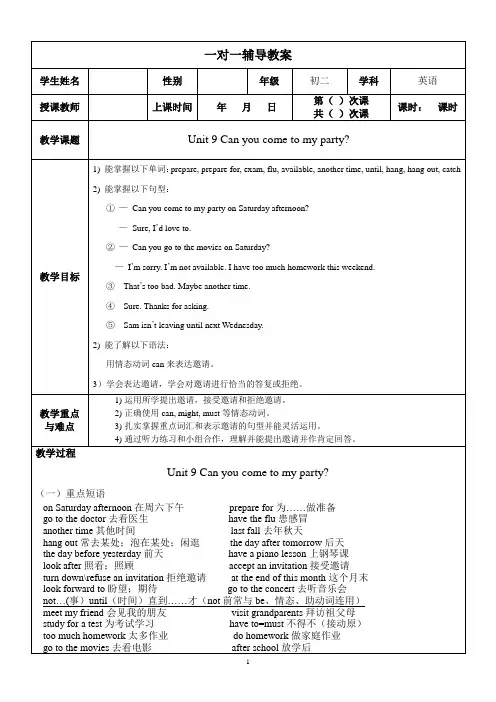
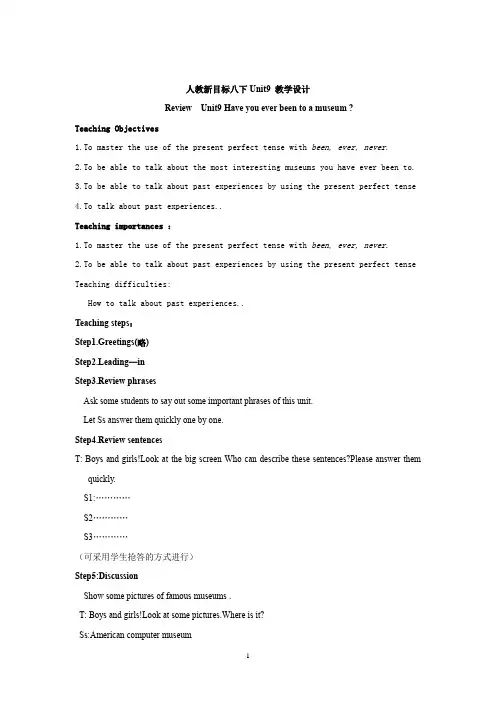
人教新目标八下Unit9 教学设计Review Unit9 Have you ever been to a museum ?Teaching Objectives1.To master the use of the present perfect tense with been, ever, never.2.To be able to talk about the most interesting museums you have ever been to.3.To be able to talk about past experiences by using the present perfect tense4.To talk about past experiences..Teaching importances :1.To master the use of the present perfect tense with been, ever, never.2.To be able to talk about past experiences by using the present perfect tense Teaching difficulties:How to talk about past experiences..Teaching steps:Step1.Greetings(略)Step2.Leading—inStep3.Review phrasesAsk some students to say out some important phrases of this unit.Let Ss answer them quickly one by one.Step4.Review sentencesT: Boys and girls!Look at the big screen Who can describe these sentences?Please answer them quickly.S1:…………S2…………S3…………(可采用学生抢答的方式进行)Step5:DiscussionShow some pictures of famous museums .T: Boys and girls!Look at some pictures.Where is it?Ss:American computer museumT: Who can describe it ?(学生踊跃抢答)T: Look at picture 2. Where is it?Ss:the International Museum of Toilets in IndiaT: Who can describe it ?(学生踊跃抢答)T: Look at picture 3. Where is it?Ss:Hangzhou National Tea MuseumT: Who can describe it ?(学生踊跃抢答)Step6 Work in pairsT: What places have you been to? Ask your partner.Have you visited …?Have you been to …?Have you seen …?Have you tried …?(First let Ss discuss and then ask and answer in pairs )Step7.GroupworkAsk your classmates whether(是否) they have been to these places.Make a survey and reportStep8.拓展延伸Make a list of facts about your hometown or a place you have been to. Think about these topics. Size and location: ________________Population: _____________________Weather: _______________________History: ________________________Places to visit: ___________________Things to eat: ___________________Look at the map of China and write a short passageFor example:I have been to Qingdao many times. It’s a fantastic place to relax and live. Let me introduce Qingdao to you. You can….Step9 Do exercisesStep10 Homework写作要求:写一篇80字的文章描述你的家乡。
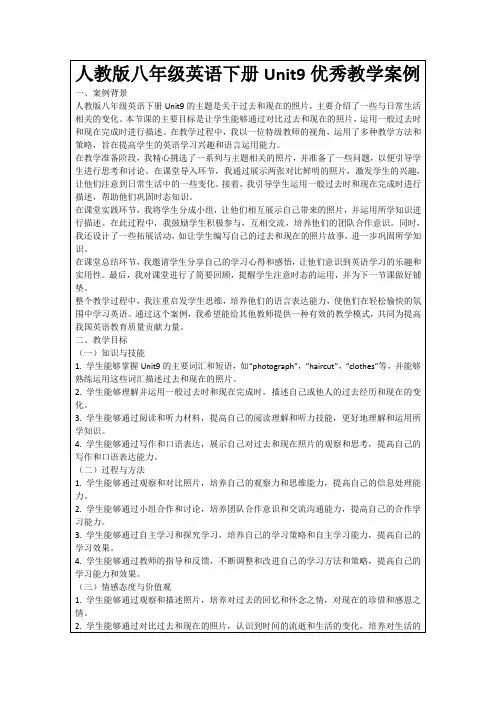
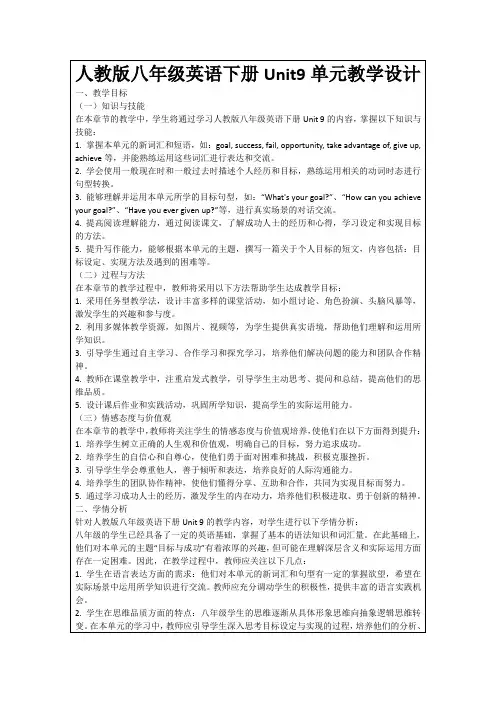
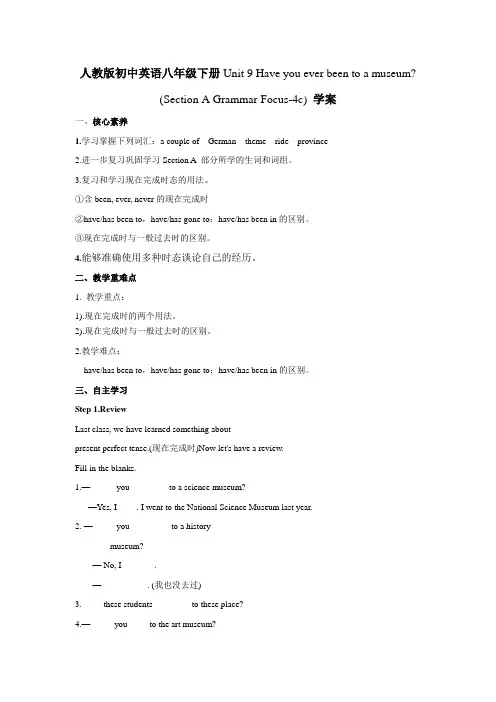
人教版初中英语八年级下册Unit 9 Have you ever been to a museum?(Section A Grammar Focus-4c)学案一、核心素养1.学习掌握下列词汇:a couple of German theme ride province2.进一步复习巩固学习Section A 部分所学的生词和词组。
3.复习和学习现在完成时态的用法。
①含been, ever, never的现在完成时②have/has been to,have/has gone to;have/has been in的区别。
③现在完成时与一般过去时的区别。
4.能够准确使用多种时态谈论自己的经历。
二、教学重难点1. 教学重点:1).现在完成时的两个用法。
2).现在完成时与一般过去时的区别。
2.教学难点:have/has been to,have/has gone to;have/has been in的区别。
三、自主学习Step 1.ReviewLast class, we have learned something aboutpresent perfect tense.(现在完成时)Now let's have a review.Fill in the blanks.1.— _____ you ____ ____to a science museum?—Yes, I ____. I went to the National Science Museum last year.2. —_____ you ____ ____ to a historymuseum?— No, I _______.— __________. (我也没去过)3. ____ these students ___ _____to these place?4.—_____ you ____ to the art museum?—I _____ _____to the art museum many times.5. —How about the nature museum? I_________ there a few times.—____(我也去过). I went there on our last school trip.6. Let’s go to the space museum. I ____ _____ _____there.Step 2. PresentationStep 3. Grammar FocusRead the Grammar Focus togetherever 和never在现在完成时中的用法have been to,have gone to, have been in的区别现在完成时和一般过去时的区别Step 4. PracticeStep 5. Work on 4aTell Ss to put the correct forms of the verbs in the blanks.1. A: Do you want________ (come) to the space museum?B: No, I’ve already _______ (be) there three times.2. A: Have you _______ (see) the robots at the science museum?B: Yes, I _______ (go) there last weekend.3. A: Let’s _______ (spend) the day at the zoo.B: Well, I’ve already ______ (be) there a couple of times, but I’m happy ______ (go) again.4. A: How about _______ (go) to the art museum? There are some special German paintings there right now.B: Sure. When do you want _______ (go)?5. A: Have you ever _______ (visit) the history museum?B: No, I’ve never ________ (be) there.Step 6. Work on 4bFill in the blanks with the correct forms of the verbs in brackets.Most of us ________ (see) Mickey Mouse, Donald Duck and other famous Disney characters in cartoons before. But have you ever ____ (be) to Disneyland? Disneyland __ (be) an amusementpark with a special theme —Disney charactersand movies. There ___ (be) many exciting rides, lovely restaurants and fantastic gift shops there. You can also ___ (see) the Disney characters walking around the park. And have you ever _____ (hear) of a Disney Cruise? This __ (be) a boat ride with a Disney theme. You can ____ (take) a ride on the boat for several days and eat and sleep on it. On the boat, you can ___ (shop) and have Disney parties before you ______ (arrive) at the Disney island.Step 7. Work on 4c四、合作探究1. ever“曾经”,一般用于疑问句和肯定句2. never“从来没有”,一般用于否定句have/has been to,have/has gone to;have/has been in的区别。
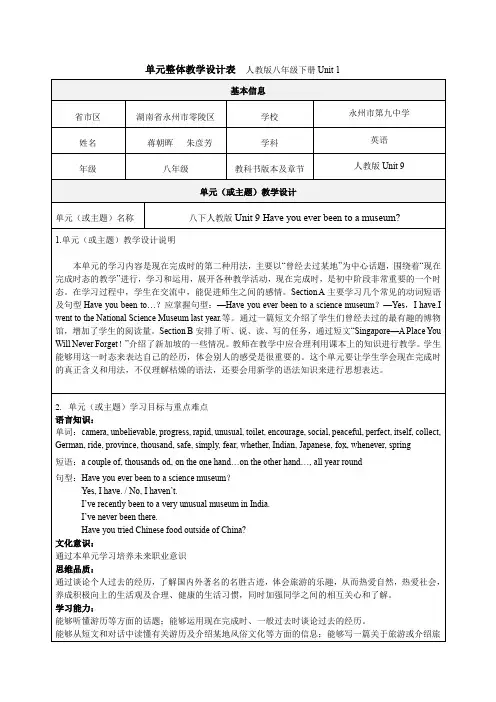
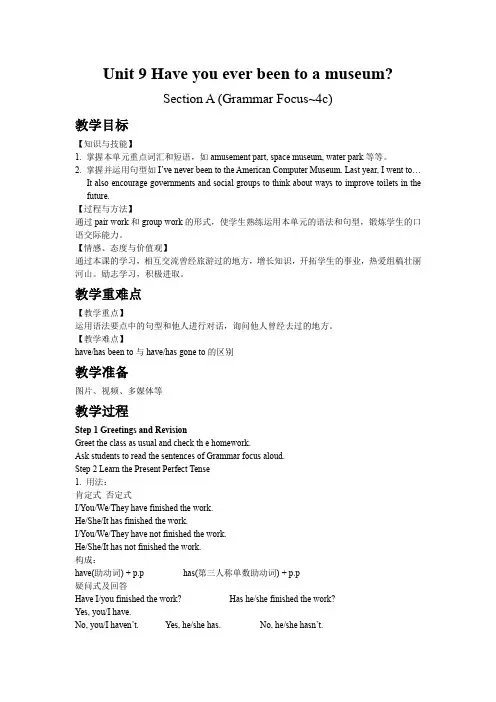
Unit 9 Have you ever been to a museum?Section A (Grammar Focus~4c)教学目标【知识与技能】1. 掌握本单元重点词汇和短语,如amusement part, space museum, water park等等。
2. 掌握并运用句型如I’ve never been to the American Computer Museum. Last year, I went to…It also encourage governments and social groups to think about ways to improve toilets in the future.【过程与方法】通过pair work和group work的形式,使学生熟练运用本单元的语法和句型,锻炼学生的口语交际能力。
【情感、态度与价值观】通过本课的学习,相互交流曾经旅游过的地方,增长知识,开拓学生的事业,热爱组稿壮丽河山。
励志学习,积极进取。
教学重难点【教学重点】运用语法要点中的句型和他人进行对话,询问他人曾经去过的地方。
【教学难点】have/has been to与have/has gone to的区别教学准备图片、视频、多媒体等教学过程Step 1 Greetings and RevisionGreet the class as usual and check th e homework.Ask students to read the sentences of Grammar focus aloud.Step 2 Learn the Present Perfect Tense1. 用法:肯定式否定式I/You/We/They have finished the work.He/She/It has finished the work.I/You/We/They have not finished the work.He/She/It has not finished the work.构成:have(助动词) + p.p has(第三人称单数助动词) + p.p疑问式及回答Have I/you finished the work? Has he/she finished the work?Yes, you/I have.No, you/I haven’t.Yes, he/she has. No, he/she hasn’t.have not 常缩略为haven’t has not 常缩略为hasn’t现在完成时的用法Have you had your lunch yet?Yes, I have. I have just had it.(现在我不饿了)表示过去发生或已经完成的动作对现在造成的影响或结果。
Section A 单词camera n.照相机;摄影机;摄像机unbelievable adj.难以置信的;不真实的progress v.&n.进步;进展rapid adj.迅速的;快速的unusual adj.特别的;不寻常的toilet n.坐便器;厕所encourage v.鼓励social adj.社会的peaceful adj.和平的;安宁的perfect adj.完美的;完全的itself pron.它自己collect v.收集;采集German adj.德国的;德语的;德国人的n.德语;德国人ride n.供乘骑的游乐设施;短途旅程province n.省份amusement n.娱乐;游戏somewhere adv.在某处;到某处invention n.发明;发明物invent v.发明;创造performance n.表演;演出theme n.主题短语amusement park游乐场lead to导致put up搭起think about考虑make tea沏茶tea art 茶艺tea set茶具equator n.赤道短语take a holiday度假three quarters四分之三at night在夜晚all year round全年be close to 靠近be far from远离……thousands of 数以千计的;许许多多的whether…or…不管……还是……on the one hand…on the other hand…一方面……另一方面……句型1.On the one hand,more than three quarters of the population are Chinese,so you can simply speak Putonghua a lot of the time. On the other hand,Singapore is an English-speaking country,so it’s also a good place to practice your English! 一方面,超过四分之三的人口是华裔,因此很多时候你可以只说普通话。
教学设计Listen again. Listen and check the boxes. Have these students ever been to these places?SciencemuseumHistorymuseumArt museum NaturemuseumSpace museum ClaudiaSarah √Step 5 SpeakingAsk and answer in pairs:A: let’s go somewhere different today.B: OK. Where do you want to go?A: Have you ever been to the space museum?B: No, I haven’t. How about you?A: …Step 6 Listening 2a 2bListen and circle the places that you hear.Listen again and circle T for true or F for false.Conversation 11. Tina went to the space museum last year. T/F2. John has never been to the space museum. T/F3. They are going to take the subway. T/FConversation 21. Linda has been to the amusement park. T/F2. Linda went to the amusement park yesterday. T/F3. Linda is going to the amusement park again by bike. T/FConversation 31. Frank had a great time at the water park. T/F2. Frank’s friend has never been to the water park. T/F3. Frank and his friend are going skating. T/FAnswer: TFT TFT FTTSpeakingLook at the map in 2a and make conversations about the places.A: Have you ever been to the space museum?B: Yes, I have. How about you?A: No, I haven’t.B: Oh, it’s fantastic. Let’s go tomorrow.A: OK. How are we going to get there?B: We can take the subway.SpeakingRole-play the conversation in 2d.Step 1 RevisionWhat do you know about Singapore?position: Where is Singapore?position: in Southeast AsiaPopulationMore than three quarters of the population are Chinese.LanguageChinese and English.FoodA lot of food from China, such as rice, noodles and dumplings.Indian food, western food and Japanese food.ZooSingapore has a special zoo called the “Night Safari”. A lot of animal only wake up at night, so this is the best time to watch them.WeatherThe temperature is almost the same all year round.Step 2 Writing3b Write an article to advertise your hometown or a place you have been to.句型:Have you ever tried/seen/been…?If you…, you will/can…You should…One great thing about …is…Step 3 Self check1. Think about the things below and write an answer for each one.1) One thing that you have collected before:_________________________________2) One invention that you have found to be very useful:_________________________________3) One unbelievable or unusual thing that you’ve seen or hea rd recently:_________________________________4) One way that you’ve used to encourage a friend in the past:_________________________________5) One peaceful and quiet place that you’ve been to recently:________________________________( )35.Which one can be the best title?A. Different animals in TanzaniaB. The ways of traveling in TanzaniaC. Why do we take a bus to travel?D. The beautiful country-TanzaniaBWhen you are in England,you must be very careful in the street because the traffic drives on the left. Before you cross a street,you must look to the right first and then the left. If the traffic lights are red,the traffic must stop. The people on foot can cross the road carefully. If the traffic lights are green,the traffic can go. The people on foot must not cross. In the morning and in the evening when people go to or come from work,the streets are very busy.When you go by bus in England,you have to be careful,too. Always remember the traffic moves on the left.So you must be careful. Have a look first or you will go the wrong way. In many English cities,there are big buses with two floors. You can sit on the second floor. From there you can see the city well. It is very interesting. ( )36.When you are in England, you must be more careful in the street because________.A. there are many cars and buses on the roadB. there are no traffic lightsC. the buses and cars move on the leftD. people on foot may cross the road( )37.In England,before you cross a street, you must look to first and then________.A. the right;the leftB.the left;the rightC. the front;the backD. the back;the front( )38. If the traffic lights are green, can go, mustn’t cross.A. the people on foot;the trafficB. the traffic;the people on bikeC. buses;carsD. the traffic;the pe ople on foot( )39. In England, you must always remember that the traffic _______.A. is busyB. moves on the leftC. moves on the rightD. with two floors ( )40. In many cities in England, there are big buses ________.A. with a lot of people in themB. with lots of seats in themC. with two floorsD. with interesting colors五.单词拼写(共10小题;每小题1分,满分10分)http://w ww.xkb 1. comA)根据首字母及汉语提示,完成下列单词的拼写,使句意明确,语言通顺。
北戴河新区长白学校教师备课笔记
Step 1 Revision
Play the song “If you are happy, please clap your hands.
T: Do you know the name of this song?
Ss: Yes, “If I am happy, I’ll clap my hands”.
T:(教师重复并问学生)If you are happy, you’ll clap your hands. Are you happy today?
Ss: Yes.
T: If you are happy, please clap your hands.
Ss: ××, ××,××(学生们一起拍手)
T:(问一名学生)If you are happy. What will you do?
S1:If I am happy, I’ll go to the movies.
T:(问另外一名学生)What about you?
S2: I’ll go out for a visit but I don’t have enough money.
T:(问另外一名学生)If you have a lot of money. What will you do?
S3: If I am happy, I’ll buy a big house for my parents.
T: Good boy. (Ask another student.) What about you?
S4: I’ll give most of the money to the poor.
T: How about you?
Ss: I’ll travel around the world.
T: Have you ever been to America?
Ss: No.
T: Now, we’ll learn Unit 9 Have you ever been to an amusement park?
Step 2. ①Show some pictures and teach the following words: (an) amusement park, space museum, aquarium, zoo, water park, Disneyland.
Have you ever been to a/an… ?
(a)space museum
(a)water park
(an)amusement park (an)aquarium
(a)zoo (a)Disneyland
②Practise the drills in pairs.
(Divide the class into 2 groups and have a competition.)。